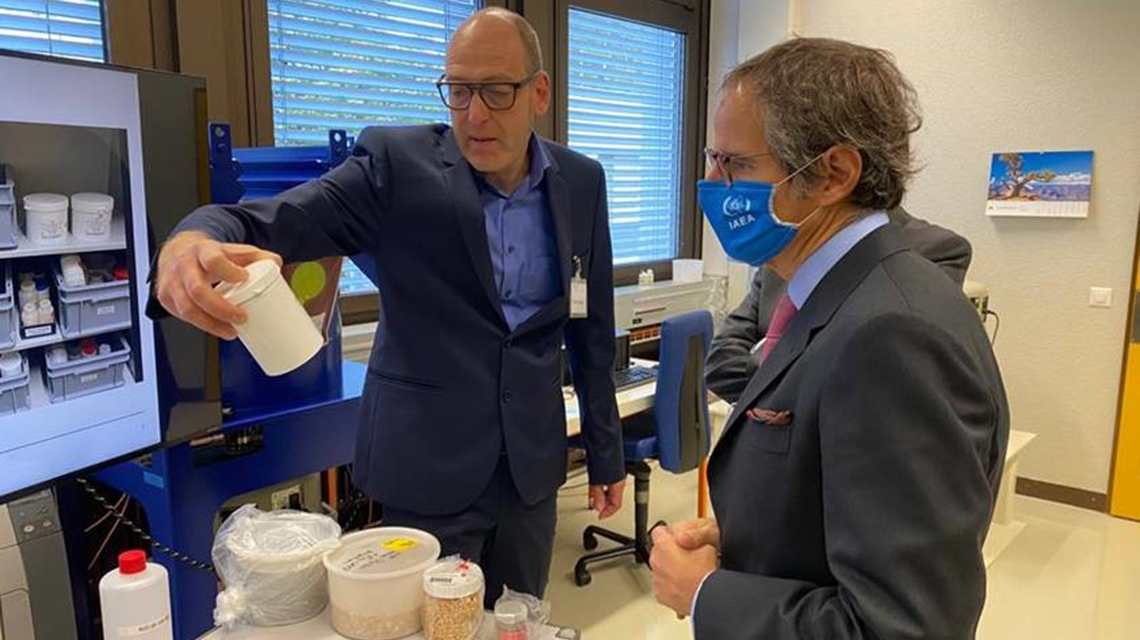The Swiss government is committed to support the work of the IAEA, with an emphasis on projects that use nuclear technology to help countries meet the UN Sustainable Development Goals (SDGs), senior Swiss federal officials told IAEA Director General Rafael Mariano Grossi in Bern today.
In his meetings with Ignazio Cassis, Head of the Federal Department of Foreign Affairs and Patrizia Danzi, Director General of the Swiss Agency for Development and Cooperation, Mr Grossi introduced new IAEA programmes supporting SDGs such as the Women's Cancers Partnership Initiative, an upcoming project to combat plastic pollution and the Marie Sklodowska-Curie Fellowship Programme, which aims to increase the number of women studying nuclear-related subjects at the graduate level.
He highlighted ZODIAC, an initiative to prevent and combat future pandemics of zoonotic origin.
"COVID-19 will certainly not be the last pandemic which threatens the world. I have therefore proposed a new IAEA Zoonotic Disease Integrated Action project, known as ZODIAC, to establish a global network of national diagnostic laboratories for the monitoring, surveillance, early detection and control of zoonotic diseases, using nuclear or nuclear-derived techniques," Mr Grossi said.
The IAEA's projects are built on the Agency's core expertise and experience as well as on close collaboration with other international and UN organizations, such as the World Health Organization (WHO), he said. "Our work has perfect synergies with those of other organization towards the achievements of the SDGs and we complement each other perfectly," Mr Grossi said.
Mr Cassis and Mr Grossi discussed the IAEA's nuclear verification work, including in Iran. Mr Cassis commended the IAEA for its ongoing nuclear safeguards activities under the travel restrictions in place due to the pandemic.
Nuclear Power, Safety and Security
In meetings with Benoit Revaz, Head of the Swiss Federal Office of Energy and Georg Schwarz, Deputy Director General of the Swiss Federal Nuclear Safety Inspectorate, Mr Grossi and his hosts discussed the Agency's work in nuclear decommissioning and nuclear safety and security.
"The various safety upgrades at the Beznau Nuclear Power Plant reflect the longstanding Swiss safety culture enshrined in the principle of continuous improvement of nuclear safety," said Mr Grossi at the plant. "We look forward to Switzerland continuing to share this important experience with its international partners."

IAEA Director General Rafael Mariano Grossi visiting the Beznau Nuclear Power Plant in Switzerland. (Photo: E. Perez Alvan/IAEA)
Swiss officials emphasized the importance of nuclear safety and security and the contribution of the IAEA in these areas by setting international standards and guidance.
In 2018, an IAEA International Physical Protection Advisory Service (IPPAS) nuclear security review mission to Switzerland noted that the country's nuclear security regime is well-established and incorporates the fundamental principles laid out in international agreements. An IAEA Integrated Regulatory Review Service (IRRS) mission is scheduled for 2021 to help the country further strengthen and enhance the effectiveness of its regulatory infrastructure for nuclear, radiation, radioactive waste and transport safety.
At the Beznau Power Plant, which has been operational since 1969, Mr Grossi talked about the importance of the long-term operation of nuclear power plants as a cost effective way in the transition to clean energy. And when their lifetime comes to an end, reactors need to be decommissioned safely - as Switzerland is planning to do by 2050.
"In the coming years, we will see considerable decommissioning work on power reactors, research reactors and other types of facility. The Agency will work closely with Switzerland on addressing these challenges and share knowledge on waste/spent fuel management," Mr Grossi said.
Joint research
At the Spiez Laboratory, an IAEA Collaborating Centre in the study of radionuclides in the environment, Mr Grossi and Laboratory Director Marc Cadisch reviewed joint initiatives in marine and terrestrial environmental research and discussed potential collaboration in nuclear forensics and in research into zoonotic diseases. Mr Grossi thanked institute staff for offering to analyse samples collected following last month's blast at the Port of Beirut, collected at a recent IAEA Assistance Mission to Lebanon.

IAEA Director General Grossi visits the Spiez Laboratory in Switzerland. (Photo: E. Perez Alvan/IAEA)






